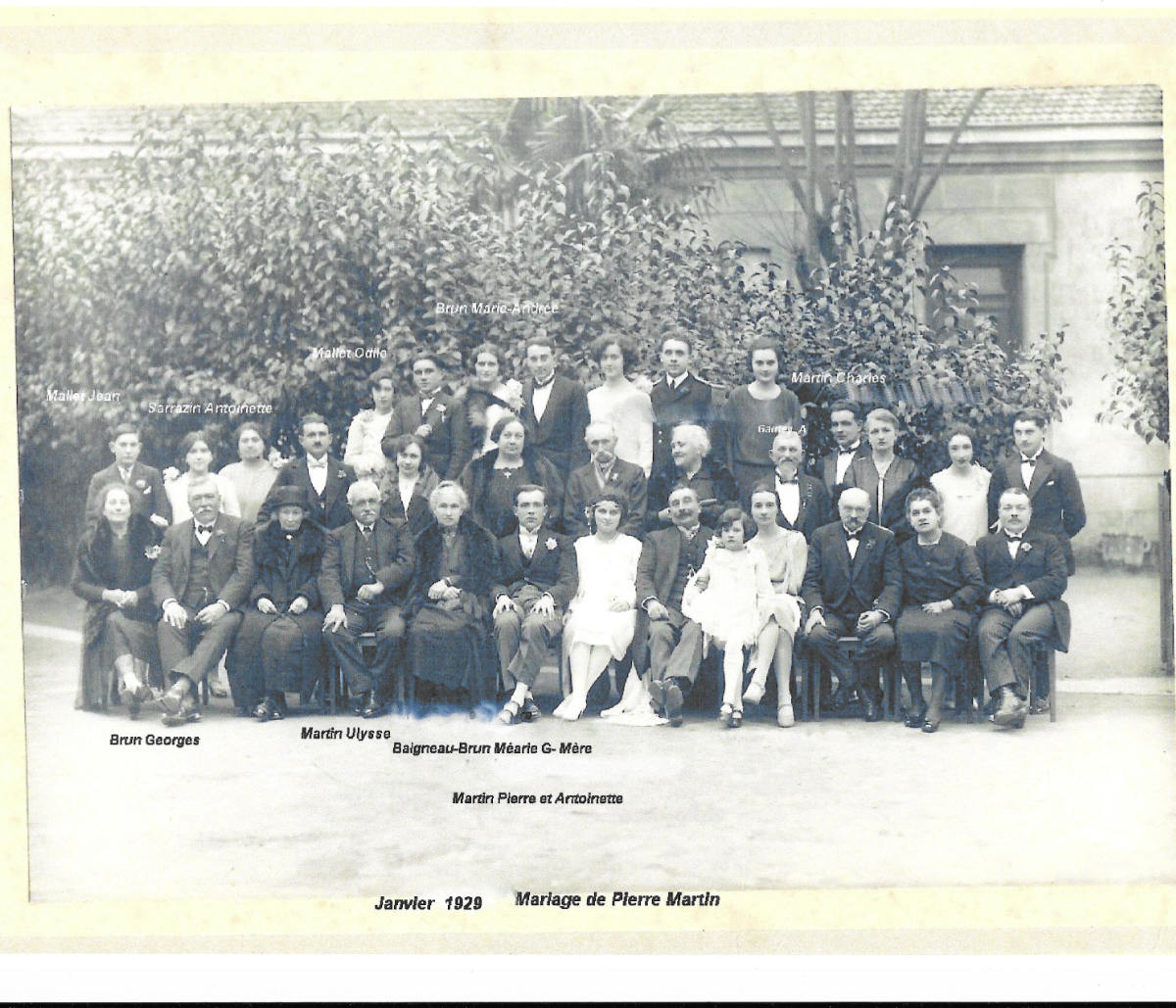My father, Pierre Marie Jean Andre Martin, was born in 1903 in Sainte Terre, a small town along the Dordogne River in the Gironde department in Nouvelle-Aquitaine in southwestern France, the first-born child of Ulisse and Marie Suzanne Martin. My dad was only three and Mon oncle Charles was one when their mother died of tuberculosis. In the early nineteen twenties, my dad and his brother Charles moved a few miles away to Rauzan with their father to manage the family vineyard. Pierre and Charles received a sixth-grade education, equivalent to completing elementary school in the French system. At age fourteen, the sons started working with their dad in the vineyard.
My grandfather was part of the village council. Before their Wednesday evening meetings after supper, he would shave and get ready. But at some time before time to leave for the meeting, he would say, “They can do it without me,” and never attended the meetings.
My mom, Marie Marguerite Antoinette Holstein, was born in 1908 in Moulon, a commune in the Entre-Deux-Mers region not very far from Rauzan. She was the first child of Camille and Marie Madeleine Charlotte. My mom and her brother Roger lived in the country family home with their dad. Their mom died while they were young. I once asked my mom, “How did you spend your time in the summer when you were a little girl?” And she responded, “Once I rubbed an apricot pit on a stone wall until I had a hole and used it as a whistle.” I think about her every time I eat an apricot.
My parents met through family friends and, after a short courtship, were married in January of 1929. They honeymooned on the Mediterranean traveling by train to Nice. My mom moved into my dad’s family home, Troupagat, a typical country home just outside Rauzan. My dad was still tending the vineyard, pruning in the winter, suckering and edging in the summer, and holding the plow pulled by a horse.
Marthe Pellet, a family friend living nearby, told often how my dad as a young man, could be heard from far away yelling at his horse not walking straight the vineyard row. Much later when I was a young boy, and usually on Sunday afternoons, I accompanied my father to a farm where he heard a draft horse was for sale. He would place his thumb on the back of the horse’s mouth to open it to verify its age: the longer the teeth, the older the horse. Then it had to bravely pull a cart to estimate its strength. My dad was wearing his usual double-breasted suit with a white shirt, the only clothes he wore after he stopped working manually in the vineyards.
In 1930, my sister Rosy, was born, followed by our mischievous brother Michel in 1931. The story is told that Michel loved to visit the farm next door, sometimes switching eggs from a hen to the nest of a mother duck, and vice versa. After the eggs hatched, chaos ensued when the hen tried to prevent her ducklings from going into the nearby pond, and the mother duck encouraged the chickies to get in and swim. Of course, the neighbor would come over to tell my mom, “You have to keep an eye on your son!”
Soon after my brother Bernard was born in 1938, Germany and France were at war. Rauzan was in the German-occupied zone, and my parents had to give room and board to two officers. Though they wanted to be friendly and eat their meals at the long kitchen table with the family, the rules were very strict. My mom remembered how sad they were, leaving the kitchen with their tray to eat by themselves in their room. They also wanted to listen to the news on the radio but were not allowed to do so. One of the officers, upon coming back from a leave in Germany, brought a toy gun to give Michel. It was not appreciated by my parents.
By the time Rosy and Michel were about eleven and ten, they were sent to boarding school in Bordeaux. This was during World War II and they recall having to walk alone in the dark to La Croix de Jugazan, a bus stop along the country road, to return to their school. The school was cold, and there always seemed to be a lack of food. My mom recalled that Michel was often spotted by the back fence trying to escape. Rosy, always very curious, got in trouble by sneaking into the school basement laundry room to see how the nuns managed to get their head coverings starched.
In the mid 1930s, my dad was elected the mayor of this little town, a position he held until he died in 1974. During the same time, financial crisis in the wine industry and the expansion of the family vineyard prompted him to create the first Cooperative Winery. The idea, revolutionary at the time, was that the growers would bring their grapes to the coop to be processed and as the wine was sold, they received dividends proportional to the amount of grapes they brought in. I remember as a kid watching the long lines of carts pulled by horses or oxen winding through the village. My dad stood in front of the winery greeting the growers and directing the traffic, always in his suit and white shirt. It became the largest cooperative in France and my father remained its President until his death. To this day his large portrait is predominantly displayed on the wall of the board room.
In 1938, Bernard was born. I heard my mom recalling that as a toddler my brother played with newly hatched chickies sitting in his playpen. Simple life on the farm.


